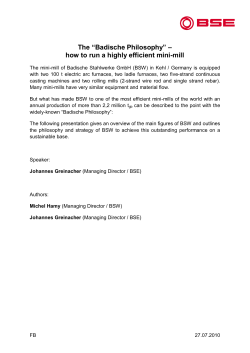
Document
Virtual Validation – More than what meets the eye Joe Fairchild Project Manager – Software Development and Validation dSPACE, Inc. What is Virtual Validation? Motivation for Virtual Validation Business Trends and Challenges: Impact on Engineering: More features Higher system complexity More customization More variants Faster time to market Shorter development cycles Higher quality More testing Higher safety More processes (and even more testing) Bottom line: Lower costs We need smarter solutions to the challenges above Motivation for Virtual Validation Discovering issues earlier in the product development cycle saves time and money How? - Simulation costs less per hour, tests can be repeated with higher frequency, and the sooner we discover an issue, the quicker it can be addressed. Cost Factor $ x 100 $ x 10 $x5 $x1 SIL Test HIL Test Test Bench Field Test Point when issue is discovered Production Virtual Validation challenges What is preventing us from testing earlier? How do we integrate multiple models or ECUs without hardware? How do we simulate the effects of our ECU operating systems? How do we get the most benefit out of our simulation and testing tool chain? Pieces Required for Simulation and Testing Device / System Under Test Environment Models .c Execution Platform Test Tools 6 Pieces Required for Simulation and Testing Device / System Under Test Environment Models .c dSPACE’s Philosophy: Utilize industry standards Create scalable solutions Enable smooth transitions between phases of development Execution Platform Test Tools 7 Pieces Required for Simulation and Testing Device / System Under Test Environment Models .c Execution Platform Test Tools 8 AUTOSAR – The Key Enabler of Virtual ECUs Evolution of AUTOSAR Trend: Use commercial off-the-shelf (COTS) components to handle basic functionality Application becomes more focused and less hardware-dependent Promotes re-use of Application software components Benefit: Application code with standardized interfaces enables simulation without hardware and without instrumenting code Application Application Application COTS COTS 9 AUTOSAR Software Development Methodology Application RTE BSW 1 BSW 2 BSW 3 BSW 4 OS Library of software components (C code functions with XML describing interfaces) System (interconnection of software components) ECU Configure OS, and basic software; generate code for RTE; compile and link 10 AUTOSAR Software Development Process Design System Architecture .xml Configure and Build Basic SW RTE .xml BSW 1 BSW 2 BSW 3 BSW 4 BSW Config Tool OS Develop Control Functions .c ECU Challenge: This step is very detailed and time-consuming, and must be repeated any time the architecture changes Virtual ECU Generation Process Design System Architecture Standardized C Code and AUTOSAR description files .xml Configure Generate and Build V-ECU Basic SW RTE .xml BSW 1 BSW 2 BSW 3 BSW 4 BSW Config Tool OS Develop Control Functions .c V-ECU ECU Virtual ECU: Production-intent application code with simulation-capable BSW stack 12 Non-AUTOSAR Virtual ECU Generation Process Specify Configuration (functions, inputs, outputs) Non-AUTOSAR C code and Configuration description .csv Develop Control Functions .c Generate V-ECU V-ECU Virtual ECU: Production-intent application code with simulation-capable BSW stack 13 Pieces Required for Simulation and Testing Device / System Under Test Environment Models .c Execution Platform Test Tools 14 Re-use V-ECU across dSPACE Platforms Virtual ECU MicroAutoBox II VEOS SCALEXIO Run production-intent code on a rapid prototyping platform Simulate realistic ECU on desktop environment without hardware Connect Virtual ECU to physical signals for Hardware-In-Loop testing 15 Pieces Required for Simulation and Testing Device / System Under Test Environment Models .c Execution Platform Test Tools 16 FMI – Standardized Model Exchange FMI = Functional Mock-up Interface Modelica Association Project 23 members https://fmi-standard.org/ Tool vendor independent simulation of models FMU = Functional Mock-up Unit Models based on FMI are exchanged as zip file with suffix .fmu Compiled library and/or C source code Model description as XML file Additional resources / libraries FMU 17 What is the Intention of FMI? Exchanging Models Reuse of models Modeling tools FMU Export Import Tools with specialized libraries Use model in other modeling tools Run on different simulation platforms Accessing Simulation FMU Test and Experimentation Tool Access Using ASAM XIL-MA V1.0.0 Simulation Integrated Tool Chain – Model Exchange Virtual ECUs Simulink Models FMUs FMU Re-use of models independent of execution platform 19 Pieces Required for Simulation and Testing Device / System Under Test Environment Models .c Execution Platform Test Tools 20 Integrated Tool Chain for Virtual ECU Development Instruments and Simulation Control Visualization and Animation Early, PC-based validation of ECU software and functions Road and Maneuver Definition Test Automation and Evaluation Reuse of models, layouts, tests, data during real ECU testing 21 Open Tool Chain for Virtual ECU Development Third-Party Modeling Tools FMI Third-Party Test Tools XCP HIL-API Utilize your current tool chain across testing platforms 22 Use Cases for Virtual Validation Offline (PC-based) Testing Virtual test drives Realistic test scenarios during software unit/subsystem testing Step-by-step debug during functional testing Rapid Control Prototyping Run AUTOSAR code on an RCP system Bypass Virtual ECU for new feature development Hardware-in-the-Loop Testing Test multi-ECU subsystems with mix of real and virtual ECUs Offline preparation of HIL simulations 23 What is Virtual Validation? A Standards-Based, Scalable, Smooth solution for doing realistic simulation and testing across the entire software development cycle Thank you for listening! © Copyright 2015, dSPACE Inc. All rights reserved. Written permission is required for reproduction of all or parts of this publication. The source must be stated in any such reproduction. This publication and the contents hereof are subject to change without notice. Brand names or product names are trademarks or registered trademarks of their respective companies or organizations.
© Copyright 2025












